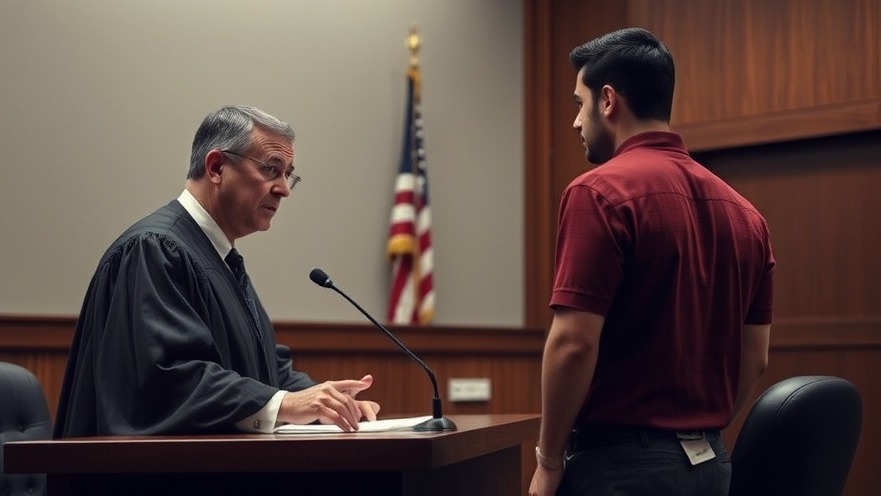
Unpacking Trump's Recent Actions on Immigration Courts
In a move that has raised significant alarm among immigration experts and advocates, President Donald Trump has enacted reforms significantly impacting immigration courts and detention procedures. These changes, notably the elimination of bond hearings and the firing of numerous immigration judges, pose substantial threats to due process rights for undocumented migrants in the United States. The ramifications will likely be most pronounced in Texas, where a large portion of the nation's immigration detention facilities is located.
A Closer Look at the Changes
Earlier this month, Trump’s administration ended bond hearings for undocumented migrants, a critical avenue through which these individuals could challenge their detention status. This change denies detained individuals an opportunity for judicial review to evaluate whether their detention is warranted. Denise Gilman, a law professor and director at the Immigration Clinic at the University of Texas, pointed out that under this new system, "ICE becomes the jailer and the judge." Hence, without any judicial oversight, decisions about who remains in custody are solely influenced by the immigration enforcement agency, exacerbating concerns over prolonged detention.
Impact on Immigration Judges
Alongside the termination of bond hearings, the Trump administration has also intensified efforts to fire immigration judges, resulting in a significant reduction of available judges to process cases. Reports indicate that more than 100 judges have either resigned or been dismissed since January 2025. This continues a trend of purging immigration judges, often those who were more favorable towards migrants' rights. The risk here is clear: fewer judges mean longer wait times for pressing immigration cases. For many migrants, this can translate into being held in overcrowded facilities for months or even years without trial, creating an unfathomable backlog.
The Broader Consequences of Due Process Erosion
Constitutional experts and immigrant rights activists are sounding alarm bells over what these changes signify for due process rights. The American Immigration Council maintains that even undocumented immigrants are entitled to due process protections under the Fifth Amendment. As Heidi Altman, vice president of policy at the National Immigration Law Center, summarized, “We are just chopping away at due process for migrants.” The loss of these fundamental rights points to concerning trends within the immigration system, echoing sentiments of existential threats to civil liberties.
The Texas Context
Texas, which boasts the bulk of immigration detention facilities across the country, is expected to feel the brunt of these changes. The state is already grappling with substantial overcrowding in federal detention facilities, with more than four million cases pending nationwide. With the infusion of new cases and diminished resources—namely fewer judges—the situation is set to worsen, possibly leading to a crisis that local DTLA and safety resources are not equipped to manage.
Activist Response and Next Steps
In response, immigrant advocacy groups are mobilizing to protect the rights of detained migrants. They argue that it’s vital for the public to understand how these policy changes threaten not only the immigrants involved but the broader implications on democracy and justice. Public awareness campaigns and legal challenges are being organized as a course of action. Activists emphasize the need for greater community engagement, highlighting the importance of avenues like calls and letters to lawmakers urging a rethink of these policies.
Future Predictions: What's Next?
The future of immigration policy under the Trump administration raises troubling questions. As the deportation machine gears up with fewer checks on its powers, Texas may witness an influx of legal challenges that could redefine immigrant rights for years to come. If activists succeed in raising awareness and pushing back against these changes, the ensuing discourse may help carve a new path towards justice and fairness in immigration policy. The public is tasked with closely monitoring these developments, as they will undoubtedly shape the fabric of immigrant lives in Texas and beyond.
Take Action: How You Can Help
As these developments unfold, it is crucial for concerned citizens to take a stand. Learning more about these immigration reforms and their implications is the first step. By staying informed and engaging with advocacy groups, you can support efforts to promote justice for detainees. Characterizing the impact of these changes resonates beyond Texas alone; it challenges notions of justice and rights nationwide. Arm yourself with knowledge and prepare to advocate for the rights of all individuals.
 Add Element
Add Element  Add Row
Add Row 



Write A Comment